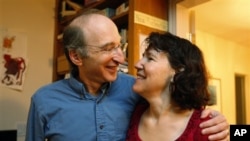Three U.S.-born scientists have won this year’s Nobel Prize in physics for their research on the expansion of the universe. Their research suggests that that expansion might be speeding up, thanks to a mysterious force known as dark energy.
Americans Saul Perlmutter and Adam Riess, along with U.S.-born Australian scientist Brian Schmidt have spent years mapping the universe by analyzing the light from decaying supernovas, or exploding stars.
They found that the light put out by more than 50 of the distant stars is weaker than they expected, which indicates that the universe is expanding at an accelerating rate. That acceleration is thought to be driven by dark energy, though cosmologists have little idea what dark energy is.
Before these discoveries, scientists believed that the expansion was slowing, more than 14 billion years after what’s called “the Big Bang,” the violent explosion thought to have started the universe.
Borje Johansson is the chairman of the Nobel committee for physics.
“This discovery of the accelerating expansion of the universe is a milestone for cosmology," said Johansson. "The expansion history of the universe gives us insights into the evolution of the universe and possibly about the ultimate fate of the universe.”
That fate could be a colder one than previously thought: in its citation for the three physicists, the Nobel committee said if their research is correct and the universe’s expansion is accelerating, it could mean the universe will end in a kind of cosmic deep freeze.
Speaking by phone to a news conference Tuesday, Schmidt said he was amazed and surprised by the announcement.
“I was saying it feels like when my children were born," said Schmidt. "I feel kind of weak in the knees, very excited and somewhat, I guess, amazed by the situation.”
Schmidt, from the High-z Supernova Search team in Australia, will share one-half of the $1.5 million award with American Adam Reiss from Johns Hopkins University in Baltimore. The other half will go to Saul Perlmutter, who works with the Supernova Cosmology Project at the Lawrence Berkeley National Laboratory and the University of California, Berkley.
Schmidt said Tuesday he had no idea he would win the prize, and he was honored to receive it.
“No I did not expect it," he said. "It’s one of these things that you, I guess occasionally people mention it but you know, I guess it’s one of these things that you think is probably never going to happen.”
The prizes are named for Alfred Nobel, a Swedish-born scientist, inventor, entrepreneur and peace activist best known for inventing dynamite.
The prize for medicine was handed out Monday. The Royal Swedish Academy of Sciences will name the winner in chemistry Wednesday. The Nobel Prize in Literature will be given Thursday. The 2011 Nobel Peace Prize recipient will be named Friday. An award for economics, given in memory of Alfred Nobel, will be announced October 10.
US, Australian Researchers Honored for Studies of Expanding Universe
- By David Byrd




